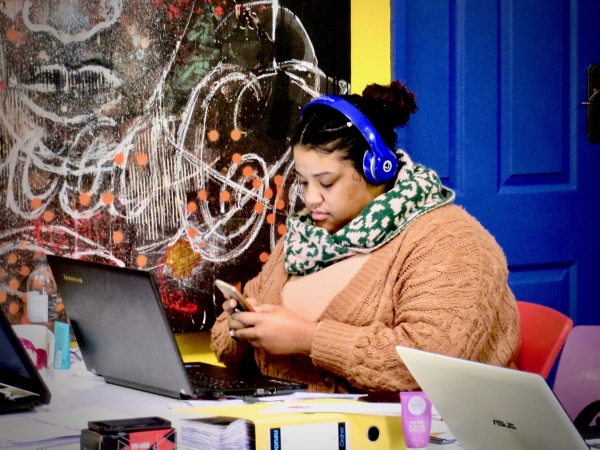South Africa needs to re-think science, technology and innovation policy
DATE: 11 July 2020
AUTHOR: Andrea Teagle
How can policy enable STI to respond rapidly and effectively to emergencies like COVID-19, against a backdrop of enduring poverty and inequality and a rapidly evolving socio-technological landscape? At a recent HSRC webinar, speakers discussed the need for more holistic and inclusive innovation policies centred on solving societal challenges.
“Why are we where we are?” Dr Mlungisi Cele, acting CEO of the National Advisory Council on Innovation asked of the socio-technological and policy landscape of South Africa. He and co-editors Prof Thierry Luescher (HSRC) and Dr Angelina Wilson Fadiji (HSRC) aimed to answer this question in their book, Innovation Policy at the Intersection: Global Debates and Local Experiences, which traces the evolution and impact of local innovation policy.
At a recent HSRC virtual book launch, Cele argued for a revisiting of South Africa’s current National System of Innovation (NSI) towards a more inclusive policy framework that placed human welfare at its centre. “Policy does not take place in a vacuum,” Cele said, adding that the relationship between policy and society was an evolving one.
Even before the advent of COVID-19, South Africa’s economy was on a low growth trajectory, characterised by high structural unemployment and inequality. These enduring socio-economic challenges, COVID-19, and local and global social justice movements such as ‘black lives matter’ and ‘me too’, formed the conjuncture of current innovation policy considerations.
Said Johan Schot, director of the Transformative Innovation Policy Consortium (TIPC), a cross-country group working towards a new framing for STI-policy, “Many of the [climate change, biodiversity, inequality] indicators really show that we are in a poly-crisis. Many people feel a need for fundamental change.”
Integration and inclusivity
Dr David Phaho of the Cape Peninsula University of Technology acknowledged that, post 1994, South Africa had taken some positive policy steps to meet the needs of a developmental state, including the (1996 and new) white papers on science and technology, and the Higher Education Act (1997) to expand the role of universities beyond teaching and research.
Phaho also highlighted positive institutional arrangements that have stemmed from policy, such as the introduction of the Small Enterprise Development Agency, reflecting the importance of enterprise development in sustainable job creation.
Yet, despite these and other efforts, “we remain mired in a huge number of contradictions and uneven development today”, charged Prof Rasigan Maharajh, Nodal Head of the DST/NRF Centre of Excellence in Scientometrics and STI Policy.
Phaho identified poor policy coordination and alignment as obstacles to realising the benefits of innovation policy. “This has resulted in sub-optimal function of the instruments, and not only did it lead to duplication but to waste of resources.”
In addition to better policy integration and collaboration within and across systems, the speakers emphasised the importance of greater inclusivity in the formulation and implementation of new STI policies. Key components of the NSI (universities) needed to move towards interdisciplinary and transdisciplinary knowledge production, Phaho said.
Webinar participant Beatrix Bouwman, chair of the South African Higher Education Community Forum (SAHECEF) expressed concern that community engagement was not an integral part of universities’ core business. “Policy is still not … supporting the breaking down of silos,” she said.
Schot suggested adopting an experimental approach to lead by example, rather than wait for policy reforms – building, for example, new platforms within universities that show how things can be done differently. “I would say let’s focus on building alternative practices. And these alternative practices also destabilise dominant [conservative] structures as much as possible.”

A woman works at her computer in an open-plan working space at Rlabs innovation hub in Cape Town, July 2019. Rlabs is an example of various 'living labs’ that bring together diverse stakeholders to address localised challenges. STI policy needs to enable greater inclusivity, say HSRC researchers. Photo: Andrea Teagle
The HSRC has previously written about the potential for the scale-up of community-led innovation hubs that bring together multiple stakeholders to address local challenges.
Phaho outlined three focal areas for innovation inclusivity. Industrial inclusiveness involves targeted support for less innovative firms, while territorial inclusiveness focuses on enhancing less innovative regions — “You can’t just have one economic powerhouse,” said Phaho. Finally, social inclusiveness aims to broaden participation of marginalised communities.
This last focus is particularly important in the context of the fourth industrial revolution, which, unguided, threatens to exacerbate joblessness, limit access to information and deepen inequality.
Paradigm shift
Responding to the confluence of global and local challenges requires moving to a completely new developmental paradigm based on different principles, Schot argued. STI policy is key to the transformation demanded by the UN’s sustainable development goals.
Drawing on insights from the TIPC, Schot outlined three global frameworks for understanding innovation policy. Firstly, traditional research and development (R&D) investment. From the 1990s, the focus moved towards national systems of innovations, which recognised the role of STI policy as linking universities, marginalised communities, private companies and other actors — a feat that South Africa has not yet fully achieved.
Finally, an additional, emerging policy framework, ‘transformative change’, referred to in South Africa’s new white paper, aims to put public welfare and a clean environment at its centre. “STI policy is in the process of becoming human centred,” Cele said. “And to an extent is driving an inclusive and sustainable development, [but] it’s not there yet.”
Critically, in this latest, aspirational framework — which the TIPC group is exploring through various pilot projects in South Africa and elsewhere — the goal of innovation is to address societal challenges. Economic growth then becomes a by-product, Schot said, rather than the aim of STI policy.

